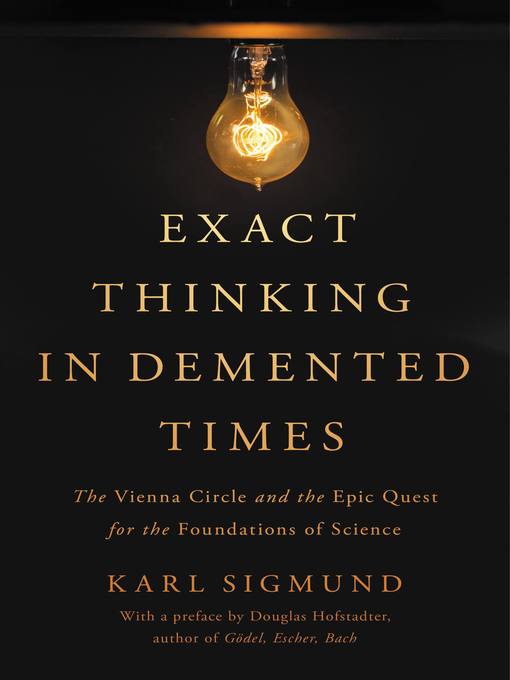
Exact Thinking in Demented Times
The Vienna Circle and the Epic Quest for the Foundations of Science
کتاب های مرتبط
- اطلاعات
- نقد و بررسی
- دیدگاه کاربران
نقد و بررسی

October 15, 2017
The course of Western philosophy was profoundly altered by the work of a small band of Vienna intellectuals a century ago. Sigmund (Emeritus, Mathematics/Univ. of Vienna; Games of Life: Explorations in Ecology, Evolution and Behavior, 2017, etc.) tells their story. The turn of the 20th century begat a significant rethinking in philosophy, away from a "muddled metaphysics" and toward a logical foundation for all of science and mathematics. David Hilbert posed unsolved problems in math, Einstein published his special relativity theory, and physicists Ernst Mach and Ludwig Boltzmann famously debated whether atoms existed. The author, one of the pioneers of evolutionary game theory, traces these ideas through the members of the Vienna Circle, from informal pre-World War I gatherings through the group's formal inception in 1924 to its dissolution following Hitler's annexation of Austria. The group held weekly lectures at the university followed by discussions at the local coffeehouses. Principal members were philosophers Moritz Schlick and Rudolf Carnap, mathematicians Hans Hahn and Karl Menger, and the left-wing social reformer Otto Neurath, but there were many visiting luminaries, including Einstein, Bertrand Russell, Ludwig Wittgenstein, and later, Kurt Godel and Karl Popper. Sigmund does not dwell on the abstruse word and language issues strenuously debated by the circle so much as sketch the colorful lives and loves of the members and their friends against the demented backdrop of interwar Vienna. The high unemployment and hyperinflation of post-1918 Vienna proved fertile ground for extreme ideologies and fanaticism, with the growth of national socialist parties as well as a deepening of a long-existent anti-Semitism. Schlick was assassinated, and once the Third Reich was in place, circle members and their friends fled. Fortunately, many found academic posts in England or America, in this way spreading the seeds of positivism in the West. Many readers will agree that we are currently living in "demented times," and Sigmund adeptly lays out a history that has great relevance for today.
COPYRIGHT(2017) Kirkus Reviews, ALL RIGHTS RESERVED.

December 1, 2017
Profiling a group of intellectuals active in Austria between the world wars, Sigmund recounts the activities of the self-styled Vienna Circle, whose ambition was nothing less than establishing, and propagating, an absolutely logical foundation of science and philosophy. Heavy as that sounds, Sigmund's story proves to be quite readable, as it is populated by angular characters who interacted in interesting and sometimes fatal ways. Most are obscure today, but the circle's members communicated with the likes of Bertrand Russell, David Hilbert, Kurt Godel, and Albert Einstein. Their leader was Moritz Schlick, a University of Vienna professor who published one of the first popular explanations of relativity theory. He convened weekly meetings whose erudite discussion topics, including the oracular pronouncements of the brusquely argumentative philosopher Ludwig Wittgenstein, Sigmund recounts in a clear and accessible manner. His account takes the circle's story through the 1920s to its demise with the 1936 murder of Schlick by a former student, and the 1938 Nazi conquest of Austria. Encapsulating an effervescent period, Sigmund's work will excite readers interested in the history of modern philosophy and science.(Reprinted with permission of Booklist, copyright 2017, American Library Association.)

























دیدگاه کاربران